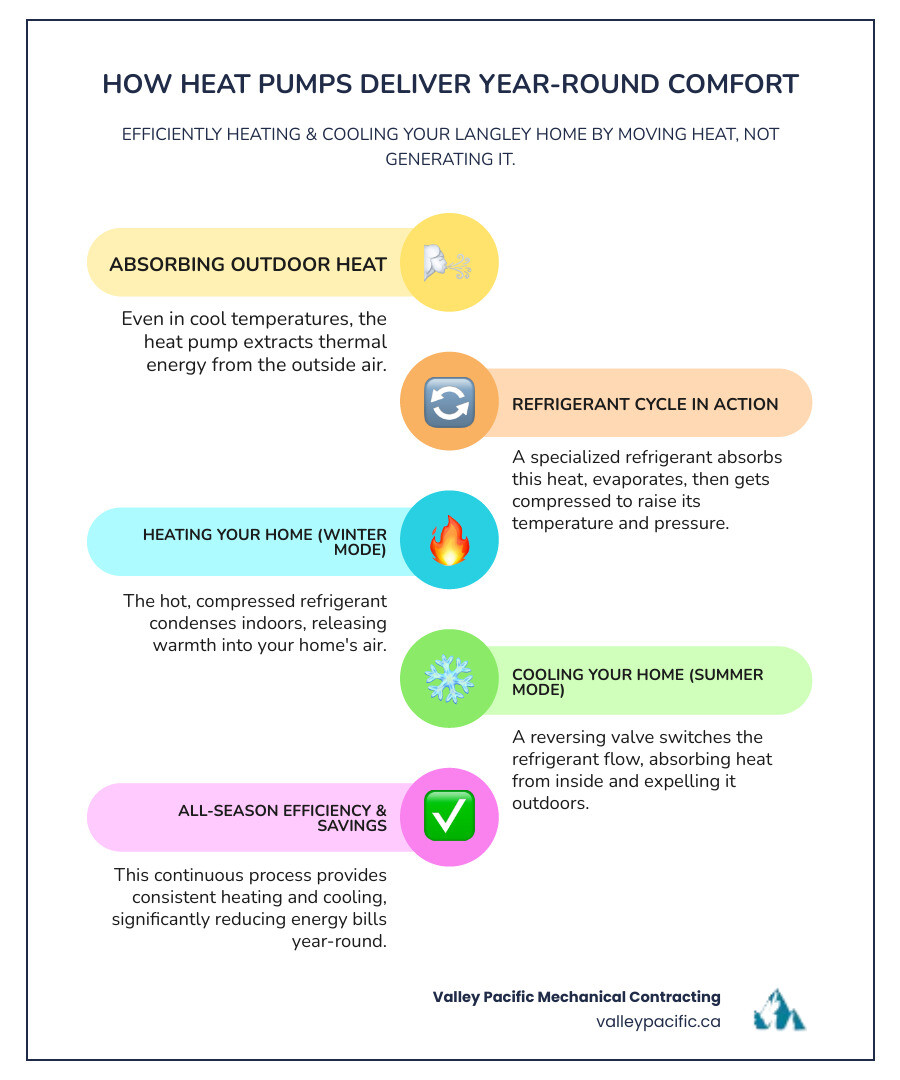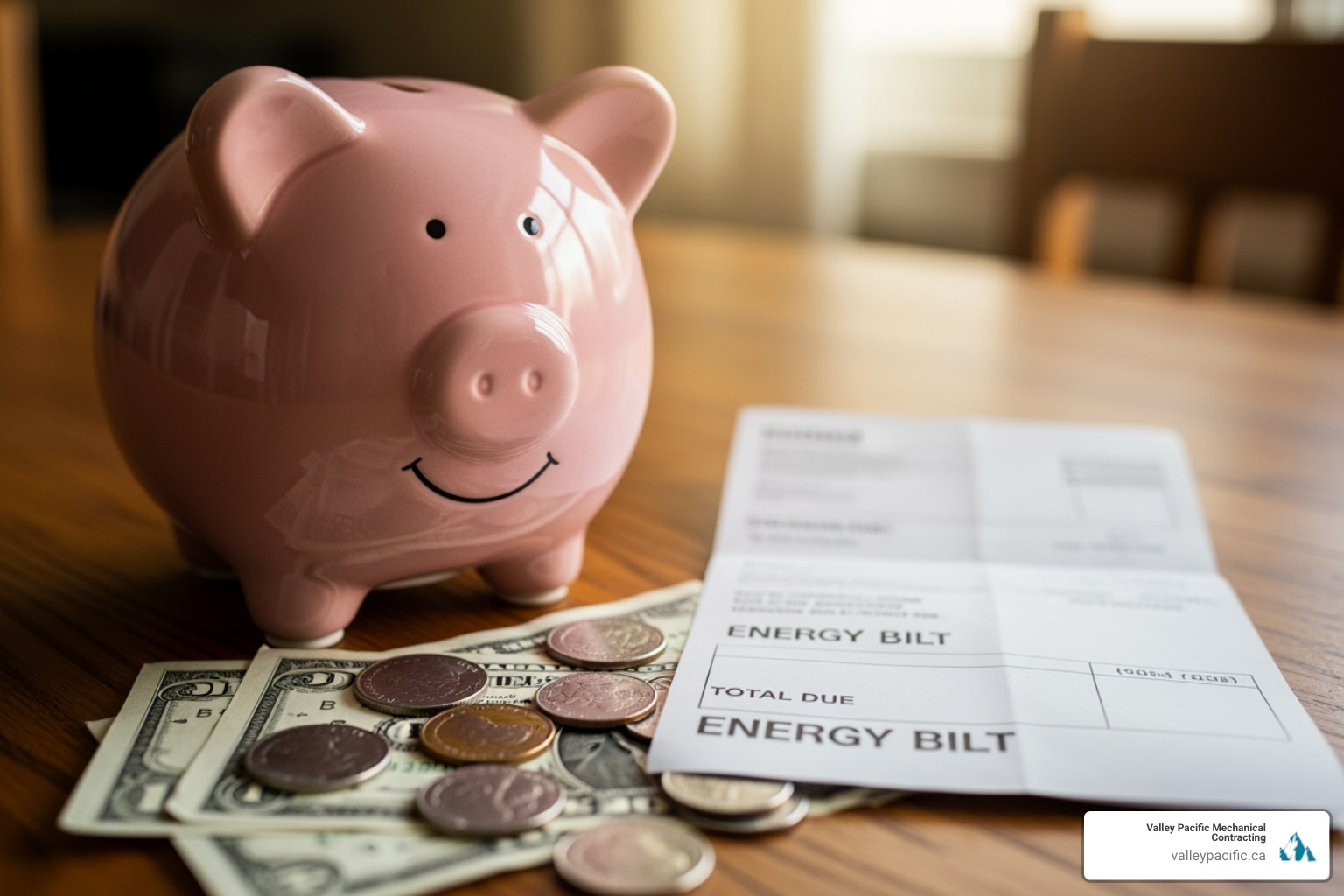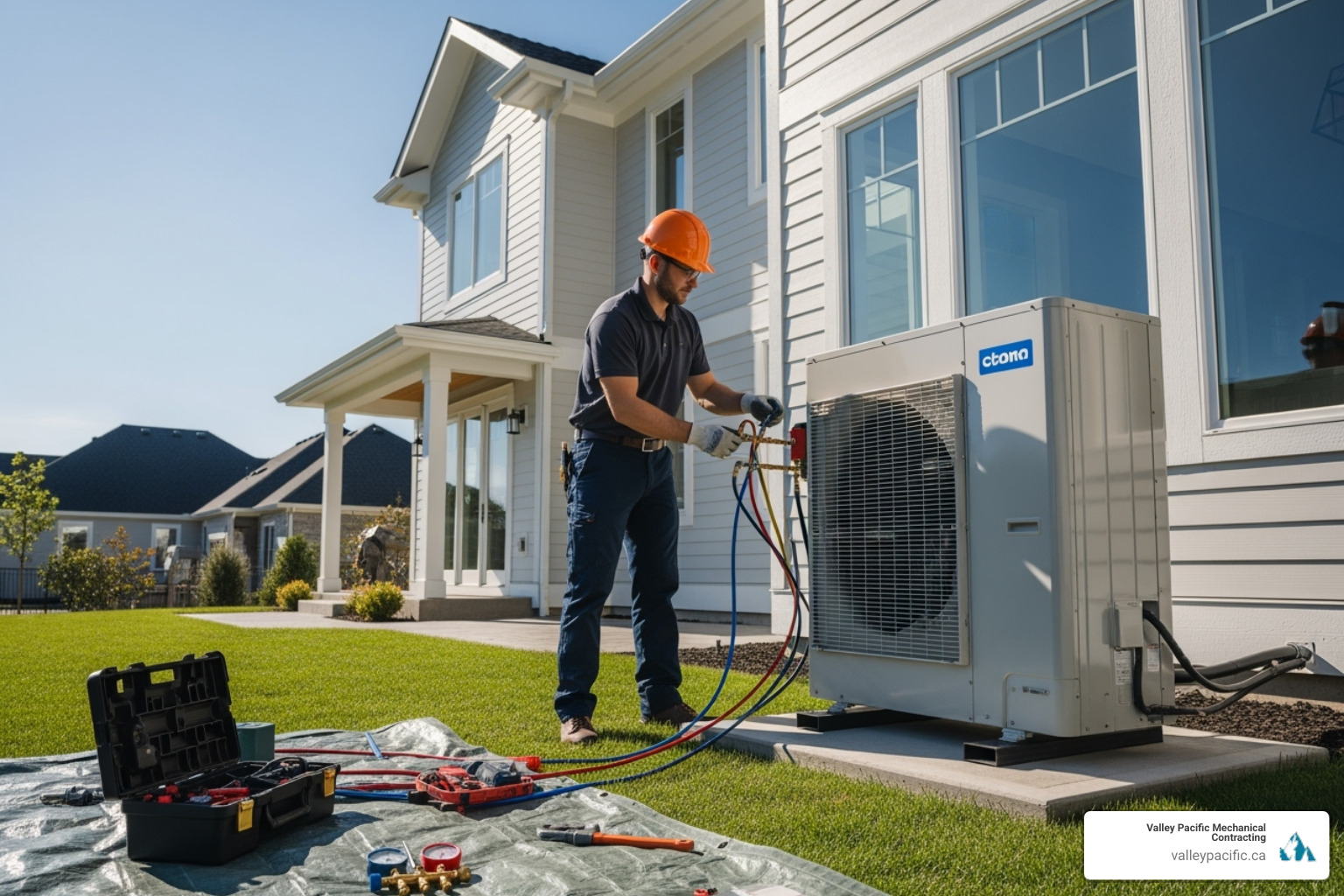Upgrade Your Langley Home with Heat Pump Installation Made Easy


Why Langley Homeowners Are Choosing Heat Pumps for Year-Round Comfort
Langley heat pump installation is rapidly becoming the smart choice for homeowners seeking efficient, year-round heating and cooling from a single, integrated system. If you're considering an upgrade, partner with a trusted local expert. With over 30 years of experience serving the Lower Mainland, Valley Pacific Mechanical Contracting offers the expertise and reliability you need, backed by the Daikin Comfort Promise for total peace of mind.
Here's a quick overview of what makes a heat pump installation in Langley so appealing:
Significant Government Rebates: Homeowners can take advantage of substantial financial incentives to make the switch more affordable. Key programs include:
- The CleanBC Better Homes Energy Savings Program, which can provide significant funding.
- Rebates for switching from fossil fuel systems (like natural gas, oil, or propane) to an electric heat pump.
- Potential municipal top-ups that add even more savings.These programs are designed to help British Columbians reduce their energy consumption and carbon footprint. For the latest details on eligibility and amounts, it's a good idea to check with local utility providers like FortisBC.
Quick and Professional Installation: For most homes, a complete heat pump installation can be completed in just one to two days, especially if you have existing ductwork. The complexity of the system and any necessary modifications can affect the timeline, but a professional team ensures a smooth and efficient process.
If you're tired of managing separate heating and cooling systems—or dealing with the high energy bills from an aging furnace—a heat pump is the ideal solution. These innovative systems function like a two-way air conditioner. They cleverly pull heat from the outside air to warm your home in the winter and reverse the process to efficiently cool it during the summer.
The moderate climate in Langley is perfectly suited for heat pump technology. Unlike colder regions that may require more robust backup systems, Langley's mild winters allow modern heat pumps to operate at peak efficiency for most of the year. This can lead to a reduction in your energy bills by up to 50% while providing consistent, comfortable temperatures day in and day out. With government rebates potentially covering a large portion of the installation costs, there has never been a better time to upgrade.
As one local homeowner shared: "It's wonderful knowing we’ve reduced our carbon footprint while enjoying a more efficient heating system. Plus, we’re heating specific parts of our house much better than before."

Basic Langley heat pump installation vocab:
Why a Heat Pump is the Smart Choice for Your Langley Home
When you're considering upgrading your home's comfort system, a Langley heat pump installation isn't just another appliance purchase – it's an investment in your family's comfort, your wallet, and the environment. We've seen how these remarkable systems transform homes across the Lower Mainland, and the benefits are truly impressive.

Let's start with what matters most to homeowners: energy savings. Heat pumps can slash your energy bills by up to 50% compared to traditional heating systems. If you opt for a hybrid system that combines a heat pump with your existing furnace, you could see savings reach an incredible 65%. Imagine opening your utility bill and actually smiling for once!
This efficiency comes from a brilliant principle – heat pumps don't burn fuel to create heat. Instead, they move existing heat from one place to another, using electricity at incredibly efficient rates. In ideal conditions, a quality heat pump can move up to 300% more energy than it consumes. Even the most efficient gas furnaces max out at about 95% efficiency, which suddenly doesn't look so impressive.
Dual functionality is another game-changer. With a heat pump, you get both heating and cooling from one sleek system. No more juggling separate furnace and air conditioning units, no more competing warranties or service calls. It's like having a Swiss Army knife for home comfort – one tool that handles everything beautifully.
The environmental benefits are substantial too. By using electricity to move heat rather than burning fossil fuels, heat pumps produce significantly fewer greenhouse gas emissions. With carbon taxes projected to climb from $50 per tonne in 2022 to $170 per tonne by 2030, choosing electric heating isn't just environmentally conscious – it's financially smart.
But here's what really gets homeowners excited: the consistent comfort. Many modern heat pumps feature variable-speed compressors that make subtle, continuous adjustments to maintain your desired temperature. This eliminates the jarring on-and-off cycles of traditional furnaces, preventing those annoying hot and cold spots. Instead, you get a gentle, steady stream of conditioned air. They also continuously circulate and filter your air, which not only maintains temperature but also creates better indoor air quality for your family.
Safety is another major advantage. Unlike gas furnaces, heat pumps pose no risk of carbon monoxide leaks because they don't burn any fuel. For families with young children or elderly relatives, this peace of mind is invaluable.
For more insights into making the right choice for your home, check out our detailed guide on reasons to consider heat pump installation and learn about the benefits of a residential heat pump system.
How Heat Pumps Provide Efficient Heating and Cooling
The magic of heat pumps lies in a fascinating principle called heat transfer. Instead of burning fuel to create heat from scratch, these clever systems move existing heat from one place to another. It's like having a heat magnet that can work in both directions.
At the heart of this process is the refrigerant cycle. A special fluid circulates through your system, absorbing and releasing heat as it changes between liquid and gas states. This refrigerant acts as a thermal courier, constantly moving energy where you need it most. As it flows through the indoor and outdoor coils, it undergoes pressure and temperature changes that allow it to either absorb heat from the air or release it.
The reversing valve is the component that makes the dual heating and cooling possible. This ingenious piece of engineering allows your heat pump to switch directions depending on the season.
During winter heating mode, your outdoor unit becomes a heat collector. Even when it's chilly outside, there's still heat energy in the air – and your heat pump extracts it. The refrigerant absorbs this outdoor heat, gets compressed to increase its temperature even more, then releases that warmth into your home through the indoor unit.
In summer cooling mode, the process flips. Your indoor unit absorbs heat and humidity from your home's air, while the outdoor unit releases that unwanted heat outside. It's essentially the same process your refrigerator uses, just scaled up for your entire home.
This year-round performance means you get consistent comfort no matter what Mother Nature throws at you. Whether it's a sweltering July day or a crisp February morning, your heat pump adapts to keep your family comfortable.
Comparing Heat Pumps to Traditional HVAC Systems
When weighing your options for home comfort, understanding how heat pumps stack up against traditional systems helps you make the best decision for your Langley home.
| Feature | Heat Pumps | Furnaces | Air Conditioners |
|---|---|---|---|
| Energy Efficiency | Highly efficient, moving up to 300% more energy than they consume. Top models achieve 20+ SEER and 10+ HSPF ratings. | Even high-efficiency gas furnaces typically reach only 96% AFUE, with older models as low as 80% AFUE. | Provide cooling efficiency similar to heat pumps but require separate heating systems. |
| Features | Dual heating and cooling functionality, smart thermostat integration, zoning capabilities, and precise temperature control. | Heating only, often requiring separate AC units. Some offer multi-stage heating for improved comfort. | Cooling only, requiring separate heating systems. May include variable speed fans and smart controls. |
| Environmental Impact | Lower greenhouse gas emissions due to electricity use and heat transfer principles rather than fuel combustion. | Burn fossil fuels, contributing to greenhouse gas emissions despite improved efficiency in modern models. | Use refrigerants with potential environmental impact but don't directly burn fossil fuels. |
| Safety | No risk of carbon monoxide leaks since they don't burn fossil fuels. Generally very safe operation. | Risk of carbon monoxide leaks if heat exchangers crack or flue pipes fail, requiring regular safety inspections. | Generally safe with no carbon monoxide risk, though refrigerant leaks can occur. |
| Lifespan | Typically 10-20 years with proper maintenance and regular service. | Usually 15-20 years, though this varies significantly based on fuel type and maintenance quality. | Generally 10-15 years, depending on usage patterns and maintenance schedules. |
The efficiency ratings tell a compelling story. While a premium gas furnace might achieve 96% efficiency, heat pumps routinely deliver 300% efficiency or higher. That's not a typo – they actually move more energy than they consume by harvesting heat from the outdoor air.
Long-term benefits extend beyond just efficiency numbers. By combining heating and cooling into one unit, heat pumps eliminate the need to purchase, install, and maintain two separate systems. This consolidation simplifies everything: you have one warranty to track, one service provider to call, and one system to learn. Over the lifespan of the equipment, this reduces potential points of failure and streamlines your annual maintenance, saving you both time and hassle.
For homeowners concerned about indoor air quality, heat pumps offer continuous air circulation and filtration. Unlike furnaces that only filter air when the heat is on, a heat pump's fan can run independently to keep air moving, capturing more dust, pollen, and other allergens. This constant circulation also helps maintain steady comfort levels throughout your home.
To learn more about optimizing your overall home comfort system, explore our guide to HVAC system checks and find how proper maintenance keeps everything running smoothly.








